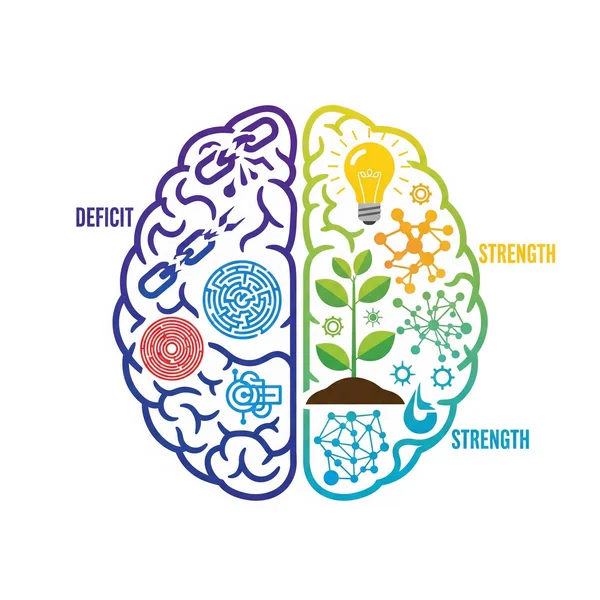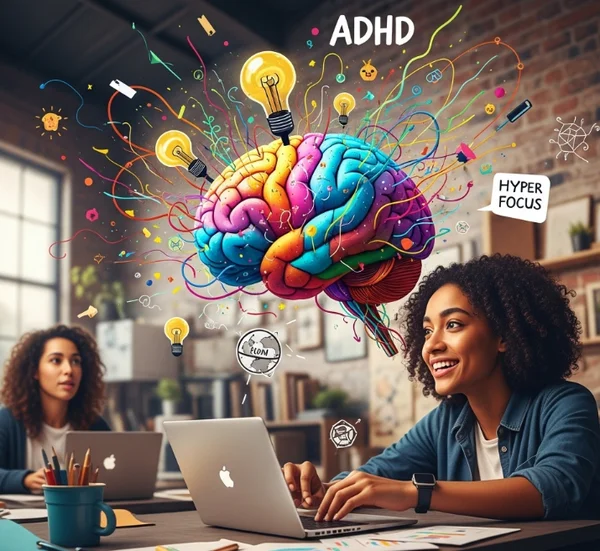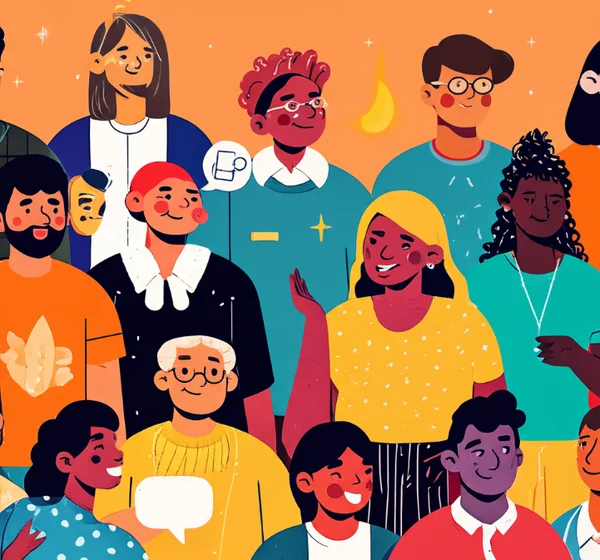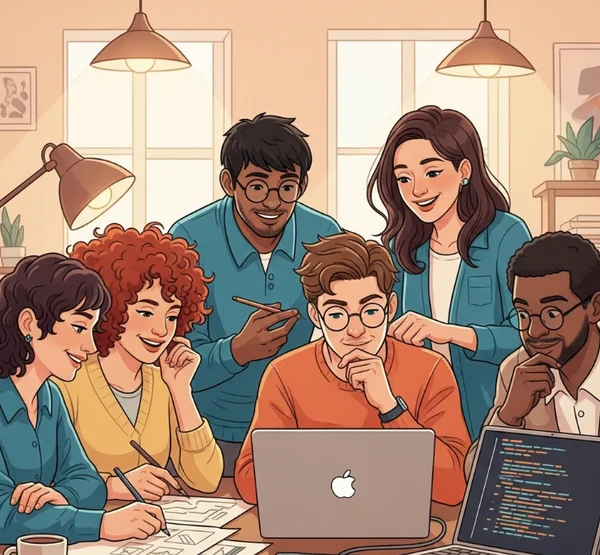ข้อได้เปรียบของความหลากหลายทางระบบประสาท: ข้อได้เปรียบที่ไม่เหมือนใครที่เราควรนำไปใช้
June 15, 2025 | By Morgan Hayes
โดยทั่วไปแล้ว เรามักจะพูดถึงความท้าทายและความแตกต่างที่ต้องได้รับการสนับสนุนเมื่อเราพูดถึงความหลากหลายทางระบบประสาท ในขณะที่การยอมรับประเด็นเหล่านี้เป็นสิ่งสำคัญอย่างยิ่ง การเปลี่ยนจุดสนใจของเราและสำรวจจุดแข็งของความหลากหลายทางระบบประสาทและข้อได้เปรียบของผู้ที่มีความหลากหลายทางระบบประสาทซึ่งมีความสำคัญเช่นกัน บทความนี้มีเป้าหมายเพื่อเปิดเผยและเฉลิมฉลองแง่มุมเชิงบวกของความหลากหลายทางระบบประสาทที่นำมาสู่โลกของเรา โดยมองข้ามมุมมองที่เน้นแต่ข้อบกพร่อง การทำความเข้าใจจุดแข็งเหล่านี้เป็นกุญแจสำคัญในการยอมรับความหลากหลายทางระบบประสาท คุณสามารถเริ่มต้น สำรวจลักษณะเชิงบวกของผู้ที่มีความหลากหลายทางระบบประสาท เพื่อขยายมุมมองของคุณ
เปลี่ยนมุมมอง: จากข้อบกพร่องสู่จุดแข็ง
เป็นเวลานานเกินไปที่ความแตกต่างทางระบบประสาทถูกมองผ่านเลนส์ของข้อบกพร่อง กระบวนทัศน์ความหลากหลายทางระบบประสาทส่งเสริมการเปลี่ยนแปลงขั้นพื้นฐาน: มองว่าความแตกต่างเหล่านี้เป็นการแปรผันตามธรรมชาติของมนุษย์ ซึ่งแต่ละแบบมีชุดจุดแข็งและความสามารถที่มีศักยภาพเฉพาะตัว
การทำความเข้าใจรูปแบบความหลากหลายทางระบบประสาทที่เน้นจุดแข็ง
แนวทางที่เน้นจุดแข็งไม่ได้ละเลยความท้าทาย แต่พยายามอย่างแข็งขันที่จะระบุและส่งเสริมความสามารถและศักยภาพที่มีอยู่ในแต่ละบุคคล โดยตระหนักว่าวิธีการคิด การเรียนรู้ และการรับรู้โลกที่แตกต่างกัน สามารถนำไปสู่ทักษะที่ไม่เหมือนใครและโซลูชันที่เป็นนวัตกรรม รูปแบบนี้เป็นพื้นฐานในการส่งเสริมสภาพแวดล้อมที่ ข้อได้เปรียบของผู้ที่มีความหลากหลายทางระบบประสาท สามารถเบ่งบานได้
เหตุใดการตระหนักถึงข้อได้เปรียบจึงมีความสำคัญต่อบุคคลและสังคม
การตระหนักและให้คุณค่าแก่ จุดแข็งของความหลากหลายทางระบบประสาท เป็นการเสริมสร้างศักยภาพให้กับผู้ที่มีความหลากหลายทางระบบประสาท ส่งเสริมความภาคภูมิใจในตนเองและเอกลักษณ์เชิงบวก สำหรับสังคม หมายถึงการเข้าถึงกลุ่มความสามารถ ความคิดสร้างสรรค์ และความสามารถในการแก้ปัญหาที่กว้างขึ้น ซึ่งสามารถขับเคลื่อนนวัตกรรมและความก้าวหน้าในทุกสาขา

จุดแข็งทั่วไปในกลุ่มอาการออทิสติก
บุคคลในกลุ่มอาการออทิสติกมักแสดงจุดแข็งที่โดดเด่นมากมาย สิ่งสำคัญคือต้องจำไว้ว่าออทิสติกเป็นสเปกตรัม และนี่คือจุดแข็งที่เป็นไปได้ซึ่งแตกต่างกันอย่างมากในแต่ละบุคคล
ความใส่ใจในรายละเอียดและความแม่นยำเป็นพิเศษ
บุคคลออทิสติกจำนวนมากมีความสามารถในการจดจ่อกับรายละเอียดที่ผู้อื่นอาจมองข้ามได้ สิ่งนี้สามารถแปลเป็นระดับความแม่นยำและความเที่ยงตรงสูงในงานที่ต้องใช้ความพิถีพิถัน เช่น การวิเคราะห์ข้อมูล การพิสูจน์อักษร หรือการควบคุมคุณภาพ
การคิดเชิงตรรกะและการจดจำรูปแบบที่แข็งแกร่ง
ความถนัดที่แข็งแกร่งสำหรับการคิดเชิงตรรกะ การจัดระบบ และการจดจำรูปแบบเป็นอีก จุดแข็งของออทิสติก ที่พบบ่อย สิ่งนี้สามารถประเมินค่ามิได้ในสาขาต่างๆ เช่น วิทยาศาสตร์ คณิตศาสตร์ วิศวกรรม และการเขียนโปรแกรมคอมพิวเตอร์
การจดจ่ออย่างลึกซึ้งและความเชี่ยวชาญในด้านที่สนใจ
ความสามารถในการจดจ่ออย่างเข้มข้น ซึ่งมักเรียกว่าไฮเปอร์โฟกัส ช่วยให้บุคคลออทิสติกจำนวนมากพัฒนาความเชี่ยวชาญอย่างลึกซึ้งในด้านที่ตนสนใจเป็นพิเศษ ความรู้เชิงลึกนี้สามารถนำไปสู่การมีส่วนร่วมและนวัตกรรมที่สำคัญได้
ความซื่อสัตย์และความตรงไปตรงมา
แนวโน้มที่จะสื่อสารอย่างซื่อสัตย์และตรงไปตรงมาสามารถเป็นทรัพย์สินที่มีค่า ส่งเสริมความชัดเจนและความไว้วางใจในความสัมพันธ์และในสภาพแวดล้อมทางวิชาชีพ แม้ว่าจะเป็นหนึ่งใน แง่มุมเชิงบวกของความหลากหลายทางระบบประสาท มากมาย และเช่นเดียวกับลักษณะอื่นๆ ทั้งหมด จะแสดงออกอย่างเป็นเอกลักษณ์
ข้อได้เปรียบที่อาจเกิดขึ้นในผู้ที่มี ADHD
โรคสมาธิสั้น (ADHD) มักเกี่ยวข้องกับความท้าทายในการใส่ใจและหุนหันพลันแล่น แต่ก็มาพร้อมกับชุด ข้อได้เปรียบของผู้ที่มีความหลากหลายทางระบบประสาท ที่เป็นเอกลักษณ์ อีกครั้ง จุดแข็งเหล่านี้แตกต่างกันอย่างมากในแต่ละบุคคลที่มีสมาธิสั้น
มีความคิดสร้างสรรค์สูงและแนวคิดที่เป็นนวัตกรรม
บุคคลที่มีสมาธิสั้นจำนวนมากแสดงความคิดสร้างสรรค์ที่โดดเด่นและความสามารถในการคิดนอกกรอบ จิตใจของพวกเขาสามารถสร้างความเชื่อมโยงใหม่ๆ นำไปสู่โซลูชันที่เป็นนวัตกรรมและแนวคิดริเริ่ม จุดแข็งของ ADHD นี้มักจะเป็นทรัพย์สินที่สำคัญ
พลังงาน ความกระตือรือร้น และความเป็นธรรมชาติ
ลักษณะ "อยู่ไม่นิ่ง" สามารถแปลเป็นระดับพลังงานและความกระตือรือร้นสูง โดยเฉพาะอย่างยิ่งสำหรับโครงการหรือกิจกรรมที่พวกเขามีความหลงใหล ความเป็นธรรมชาติสามารถนำไปสู่ประสบการณ์ใหม่ๆ ที่น่าตื่นเต้นและความเต็มใจที่จะรับความเสี่ยง
ความสามารถในการจดจ่ออย่างเข้มข้นกับงานที่น่าสนใจ
คล้ายกับบุคคลออทิสติกบางคน ผู้ที่มีสมาธิสั้นยังสามารถสัมผัสกับไฮเปอร์โฟกัส โดยเฉพาะอย่างยิ่งในงานที่ดึงดูดความสนใจของพวกเขา เมื่อมีส่วนร่วม ความสามารถในการมีสมาธิอย่างเข้มข้นสามารถเป็นเครื่องมืออันทรงพลังสำหรับผลิตภาพและความเชี่ยวชาญ
ความยืดหยุ่นและความสามารถในการแก้ปัญหาในสถานการณ์ที่ไม่หยุดนิ่ง
การจัดการกับความท้าทายที่เกี่ยวข้องกับสมาธิสั้นสามารถสร้างความยืดหยุ่นได้ หลายคนพัฒนาทักษะการแก้ปัญหาที่ยอดเยี่ยม โดยเฉพาะอย่างยิ่งในสภาพแวดล้อมที่เปลี่ยนแปลงไปอย่างรวดเร็ว ซึ่งให้ความสำคัญกับการคิดอย่างรวดเร็ว

ความสามารถพิเศษที่อาจมาพร้อมกับดิสเล็กเซีย
ดิสเล็กเซีย ซึ่งส่วนใหญ่เป็นที่รู้จักจากผลกระทบต่อการอ่านและการเขียน ยังเกี่ยวข้องกับจุดแข็งทางปัญญาที่แตกต่างกัน จุดแข็งของดิสเล็กเซีย เหล่านี้ไม่ได้เป็นสากล แต่เป็นสิ่งที่พบเห็นได้บ่อย
การใช้เหตุผลเชิงมิติสัมพันธ์ที่แข็งแกร่งและการคิดแบบ 3 มิติ
บุคคลที่เป็นดิสเล็กเซียจำนวนมากมีความโดดเด่นในงานที่ต้องใช้การมองเห็นเชิงพื้นที่ รวมถึงการคิดแบบ 3 มิติ การนำทาง และการทำความเข้าใจระบบที่ซับซ้อนด้วยสายตา นี่เป็นข้อได้เปรียบที่สำคัญในสาขาต่างๆ เช่น วิศวกรรม สถาปัตยกรรม การออกแบบ และการผ่าตัด
การคิดแบบองค์รวมและการมองเห็น "ภาพรวม"
บุคคลที่เป็นดิสเล็กเซียแสดงให้เห็นถึงความสามารถในการมองเห็น "ภาพรวม" และทำความเข้าใจระบบที่ซับซ้อนในลักษณะองค์รวม โดยสร้างความเชื่อมโยงที่ผู้อื่นอาจไม่สังเกตเห็น นี่คือหนึ่งใน จุดแข็งที่ซ่อนอยู่ของผู้ที่มีความหลากหลายทางระบบประสาท ที่สำคัญ
ความสามารถในการแก้ปัญหาและการเล่าเรื่องที่ยอดเยี่ยม
ทักษะการแก้ปัญหาที่แข็งแกร่งและความสามารถพิเศษสำหรับการคิดเชิงสร้างสรรค์ การเล่าเรื่อง และการเล่าเรื่อง มักถูกบันทึกไว้ วิธีการประมวลผลข้อมูลที่เป็นเอกลักษณ์ของพวกเขาสามารถนำไปสู่แนวทางใหม่ๆ ในการแก้ไขปัญหา
ความเห็นอกเห็นใจและทักษะด้านมนุษยสัมพันธ์ที่สูงขึ้น
การวิจัยบางชิ้นชี้ให้เห็นว่าบุคคลที่เป็นดิสเล็กเซียอาจพัฒนาความเห็นอกเห็นใจที่สูงขึ้นและทักษะด้านมนุษยสัมพันธ์ที่แข็งแกร่ง อาจเป็นเพราะการนำทางในโลกที่มักจะนำเสนอความท้าทายในการเรียนรู้
ประเภทระบบประสาทอื่นๆ และจุดแข็งที่เกี่ยวข้อง (ภาพรวมโดยย่อ)
สเปกตรัมของความหลากหลายทางระบบประสาทนั้นกว้างใหญ่ และประเภทระบบประสาทอื่นๆ อีกมากมายก็มาพร้อมกับจุดแข็งที่เป็นเอกลักษณ์เช่นกัน
Dyspraxia: ความคิดสร้างสรรค์ ความมุ่งมั่น การคิดเชิงกลยุทธ์
บุคคลที่เป็น Dyspraxia (Developmental Coordination Disorder) มักแสดงให้เห็นถึงความคิดสร้างสรรค์ในระดับสูง ความมุ่งมั่นในการเอาชนะความท้าทาย และความสามารถในการคิดเชิงกลยุทธ์ที่แข็งแกร่ง
Tourette Syndrome: ความคิดสร้างสรรค์ ไหวพริบ มุมมองที่ไม่เหมือนใคร
ผู้ที่เป็น Tourette Syndrome สามารถแสดงความคิดสร้างสรรค์ที่โดดเด่น ไหวพริบ และความสามารถในการมองโลกจากมุมมองที่ไม่เหมือนใครและมักจะตลกขบขัน
การยอมรับความหลากหลายภายในความหลากหลายทางระบบประสาท
สิ่งสำคัญคือต้องจำไว้ว่าสิ่งเหล่านี้เป็นการสรุป และสิ่งที่สำคัญที่สุดของ จุดแข็งของความหลากหลายทางระบบประสาท ทั้งหมดคือความหลากหลายนั้นเอง บุคคลที่มีความหลากหลายทางระบบประสาทแต่ละคนมีเอกลักษณ์เฉพาะตัว โดยมีการผสมผสานความสามารถและความท้าทายของตนเอง คุณสามารถเรียนรู้เพิ่มเติมเกี่ยวกับ ประเภทต่างๆ ของความหลากหลายทางระบบประสาทได้บนเว็บไซต์ของเรา

พลังของไฮเปอร์โฟกัสและความสนใจอย่างลึกซึ้ง
ในประเภทระบบประสาทต่างๆ ความสามารถในการไฮเปอร์โฟกัสและพัฒนาความสนใจที่ลึกซึ้งและหลงใหล ถือเป็นข้อได้เปรียบที่สำคัญ
การใช้สมาธิอย่างเข้มข้นเพื่อความเชี่ยวชาญ
ไฮเปอร์โฟกัสช่วยให้มีสมาธิในระดับที่ไม่มีใครเทียบได้ ซึ่งสามารถนำไปสู่ความเชี่ยวชาญในบางสาขา เมื่อบุคคลที่มีความหลากหลายทางระบบประสาทมีส่วนร่วมในหัวข้อที่ตนสนใจ ความสามารถในการดื่มด่ำกับตนเองสามารถส่งผลให้เกิดการพัฒนาทักษะและการได้มาซึ่งความรู้ที่ไม่ธรรมดา
ความรู้เฉพาะทางขับเคลื่อนนวัตกรรมได้อย่างไร
ความสนใจอย่างลึกซึ้งมักนำไปสู่ความรู้เฉพาะทางซึ่งกลายเป็นรากฐานของนวัตกรรม ความก้าวหน้ามากมายในด้านวิทยาศาสตร์ เทคโนโลยี ศิลปะ และมนุษยศาสตร์ มาจากบุคคลที่ใฝ่หาความหลงใหลในเอกลักษณ์ของตนด้วยความทุ่มเทอย่างเข้มข้น นี่เป็นตัวอย่างที่ชัดเจนของ ข้อได้เปรียบของผู้ที่มีความหลากหลายทางระบบประสาท ที่เป็นประโยชน์ต่อสังคม
ความสุขและความพึงพอใจของการมีส่วนร่วมอย่างลึกซึ้ง
นอกเหนือจากความสำเร็จภายนอกแล้ว ความสุขและความพึงพอใจโดยเนื้อแท้ที่ได้รับจากการมีส่วนร่วมอย่างลึกซึ้งในความสนใจของตนเองนั้นมีค่าอย่างยิ่งต่อความเป็นอยู่ที่ดีและความรู้สึกที่ดีต่อตนเอง
ความคิดสร้างสรรค์ นวัตกรรม และการคิดนอกกรอบ
ความหลากหลายทางระบบประสาทมักเชื่อมโยงกับความคิดสร้างสรรค์และนวัตกรรมที่สูงขึ้น
การมองปัญหาและวิธีแก้ปัญหาจากมุมที่ไม่เหมือนใคร
วิธีการประมวลผลข้อมูลที่แตกต่างกันนำไปสู่วิธีการเข้าหาปัญหาที่แตกต่างกันโดยธรรมชาติ บุคคลที่มีความหลากหลายทางระบบประสาทอาจเห็นความเชื่อมโยง ความเป็นไปได้ และวิธีแก้ปัญหาที่นักคิดแบบระบบประสาททั่วไปอาจพลาดไป โดยนำเสนอมุมมองใหม่ๆ เกี่ยวกับปัญหาที่ซับซ้อน
การท้าทายภูมิปัญญาดั้งเดิม
แนวโน้มที่จะไม่ยึดถือบรรทัดฐานที่กำหนดไว้หรือภูมิปัญญาดั้งเดิม สามารถนำไปสู่การตั้งคำถามกับสถานะที่เป็นอยู่และเสนอแนวคิดใหม่ๆ ที่รุนแรง สิ่งนี้มีความสำคัญอย่างยิ่งต่อความก้าวหน้าและนวัตกรรม
การมีส่วนร่วมของผู้ที่มีความหลากหลายทางระบบประสาทในด้านศิลปะ วิทยาศาสตร์ และเทคโนโลยี
ประวัติศาสตร์เต็มไปด้วยตัวอย่างของบุคคลที่เชื่อกันว่ามีความหลากหลายทางระบบประสาท ซึ่งได้มีส่วนร่วมอย่างมากในสาขาต่างๆ ซึ่งแสดงให้เห็นถึงผลกระทบอย่างลึกซึ้งของการคิดที่หลากหลาย การสำรวจ แง่มุมเชิงบวกของความหลากหลายทางระบบประสาท เหล่านี้เป็นแรงบันดาลใจให้
การส่งเสริมจุดแข็งของผู้ที่มีความหลากหลายทางระบบประสาท: เคล็ดลับสำหรับทุกคน
การตระหนักถึงจุดแข็งเหล่านี้เป็นขั้นตอนแรก การส่งเสริมพวกเขาคือขั้นตอนต่อไป เราจะส่งเสริม ความสามารถของผู้ที่มีความหลากหลายทางระบบประสาท เหล่านี้ได้อย่างไร
สำหรับบุคคล: การระบุและเป็นเจ้าของจุดแข็งของคุณ
ใช้เวลาในการไตร่ตรองตนเองเพื่อระบุสิ่งที่คุณหลงใหลและสิ่งที่เป็นธรรมชาติสำหรับคุณ โอบรับวิธีการคิดที่เป็นเอกลักษณ์ของคุณและแสวงหาสภาพแวดล้อมที่ให้คุณค่าแก่จุดแข็งของคุณ พิจารณาว่าลักษณะของผู้ที่มีความหลากหลายทางระบบประสาทของคุณอาจเป็น ข้อได้เปรียบของผู้ที่มีความหลากหลายทางระบบประสาท ได้อย่างไร
สำหรับผู้ปกครองและนักการศึกษา: การสร้างสภาพแวดล้อมที่สนับสนุน
มุ่งเน้นไปที่ความสนใจและจุดแข็งของเด็ก เปิดโอกาสให้พวกเขาสำรวจความหลงใหลของตนเอง ปรับสภาพแวดล้อมการเรียนรู้ให้เหมาะสมกับรูปแบบการเรียนรู้และความต้องการด้านประสาทสัมผัสที่แตกต่างกัน เฉลิมฉลองความสามารถพิเศษของพวกเขา แทนที่จะมุ่งเน้นไปที่ความท้าทายเพียงอย่างเดียว
สำหรับนายจ้าง: การสร้างสถานที่ทำงานที่ครอบคลุมและเน้นจุดแข็ง
ตระหนักถึงคุณค่าที่พนักงานที่มีความหลากหลายทางระบบประสาทนำมา สร้างแนวทางปฏิบัติในการจ้างงานที่ครอบคลุมและสภาพแวดล้อมในที่ทำงานที่ช่วยให้บุคคลที่มีความหลากหลายทางระบบประสาทเติบโตได้โดยการใช้ทักษะที่เป็นเอกลักษณ์ของตน มุ่งเน้นไปที่สิ่งที่พวกเขาสามารถทำได้ ไม่ใช่สิ่งที่พวกเขาพบว่าท้าทาย

การเฉลิมฉลองความหลากหลายทางระบบประสาท: โลกแห่งจุดแข็งที่เป็นเอกลักษณ์
การโอบรับความหลากหลายทางระบบประสาทมีความหมายมากกว่าการยอมรับ เพียงอย่างเดียว มันหมายถึงการเฉลิมฉลองอย่างแข็งขันซึ่งพรมอันอุดมสมบูรณ์ของความรู้ความเข้าใจของมนุษย์และ จุดแข็งของความหลากหลายทางระบบประสาท ที่เป็นเอกลักษณ์ที่มาพร้อมกับมัน ด้วยการเปลี่ยนมุมมองของเราจากข้อบกพร่องไปสู่ความแตกต่างและข้อได้เปรียบ เราสามารถปลดล็อกโลกแห่งศักยภาพที่ยังไม่ได้ใช้ประโยชน์และสร้างสังคมที่ครอบคลุม สร้างสรรค์ และเห็นอกเห็นใจมากขึ้นสำหรับทุกคน
คุณเคยสังเกตหรือพบจุดแข็งอะไรบ้างในตัวคุณเองหรือผู้อื่น? ร่วมแบ่งปันความคิดเห็นของคุณในช่องแสดงความคิดเห็นด้านล่าง หรือ สำรวจเพิ่มเติมเกี่ยวกับการทำความเข้าใจลักษณะของผู้ที่มีความหลากหลายทางระบบประสาท เพื่อทำความเข้าใจสเปกตรัมทั้งหมดของความหลากหลายทางระบบประสาท
คำถามของคุณเกี่ยวกับจุดแข็งของความหลากหลายทางระบบประสาท
ผู้ที่มีความหลากหลายทางระบบประสาททุกคนมีความสามารถพิเศษหรือไม่
ไม่ใช่ทุกคนที่มีความหลากหลายทางระบบประสาทจะมีความ "สามารถพิเศษ" ที่ไม่ธรรมดาในแบบที่บางครั้งมีการนำเสนอ อย่างไรก็ตาม ความหลากหลายทางระบบประสาทหมายถึงการคิดและการประมวลผลที่แตกต่างกัน ซึ่งมักนำไปสู่มุมมอง ทักษะ และวิธีการเข้าหางานที่เป็นเอกลักษณ์ ซึ่งสามารถพิจารณาได้ว่าเป็นจุดแข็ง เป็นเรื่องของการตระหนักถึงข้อได้เปรียบส่วนบุคคล ไม่ใช่การคาดหวังความสามารถแบบ savant
ฉันจะระบุจุดแข็งของความหลากหลายทางระบบประสาทของตัวเองได้อย่างไร
การไตร่ตรองตนเองเป็นสิ่งสำคัญ คิดเกี่ยวกับกิจกรรมที่คุณสนุก งานที่คุณเก่ง (แม้ว่าสิ่งเหล่านั้นจะดูไม่ธรรมดาก็ตาม) สิ่งที่กระตุ้นพลังให้คุณ และข้อเสนอแนะที่คุณได้รับเกี่ยวกับความสามารถที่เป็นเอกลักษณ์ของคุณ บางครั้ง สิ่งที่คุณรับรู้ว่าเป็นความแปลก อาจเป็นจุดแข็งในบริบทที่แตกต่างกัน
"จุดแข็ง" เหล่านี้ได้รับการพิสูจน์ทางวิทยาศาสตร์หรือไม่
การวิจัยเกี่ยวกับความหลากหลายทางระบบประสาทและจุดแข็งที่เกี่ยวข้องเป็นสาขาที่มีการพัฒนา แม้ว่าจุดแข็งเหล่านี้จำนวนมากจะถูกรายงานในลักษณะบอกเล่าและได้รับการยอมรับมากขึ้นในแวดวงวิชาชีพและวิชาการ แต่จุดสนใจก็เปลี่ยนไปสู่การทำความเข้าใจว่าองค์ประกอบทางระบบประสาทที่แตกต่างกันสามารถให้ข้อได้เปรียบในบางบริบทได้อย่างไร การเน้นอยู่ที่ประสบการณ์ที่ได้รับและพรสวรรค์ที่สังเกตได้
สถานที่ทำงานสามารถใช้ประโยชน์จากข้อได้เปรียบของผู้ที่มีความหลากหลายทางระบบประสาทได้อย่างไร
สถานที่ทำงานสามารถนำกระบวนการจ้างงานที่ครอบคลุมมาใช้ เสนอข้อตกลงการทำงานที่ยืดหยุ่น ให้การสื่อสารที่ชัดเจน สร้างสภาพแวดล้อมที่เป็นมิตรต่อประสาทสัมผัส และมุ่งเน้นไปที่การจับคู่ทักษะของพนักงานกับข้อกำหนดของงาน การให้ความสำคัญกับรูปแบบการคิดที่แตกต่างกันเป็นสิ่งสำคัญ
จะทำอย่างไรถ้าฉันไม่รู้สึกว่าตัวเองมีจุดแข็งเหล่านี้เลย
สิ่งสำคัญคือต้องอดทนกับตัวเอง จุดแข็งอาจไม่ชัดเจนเสมอไป หรืออาจไม่ตรงกับคำจำกัดความทั่วไปของ "ความสามารถพิเศษ" บางครั้ง จุดแข็งเป็นเรื่องเกี่ยวกับมุมมองที่เป็นเอกลักษณ์หรือวิธีการแก้ปัญหามากกว่า การสำรวจความสนใจของคุณและแสวงหาสภาพแวดล้อมที่คุณรู้สึกสบายใจและมีความสามารถ สามารถช่วยเปิดเผยสิ่งเหล่านั้นได้ โปรดจำไว้ว่า เว็บไซต์ Neurodivergent Test นำเสนอแหล่งข้อมูลสำหรับการทำความเข้าใจ ไม่ใช่สำหรับการกำหนดคุณค่าของคุณ